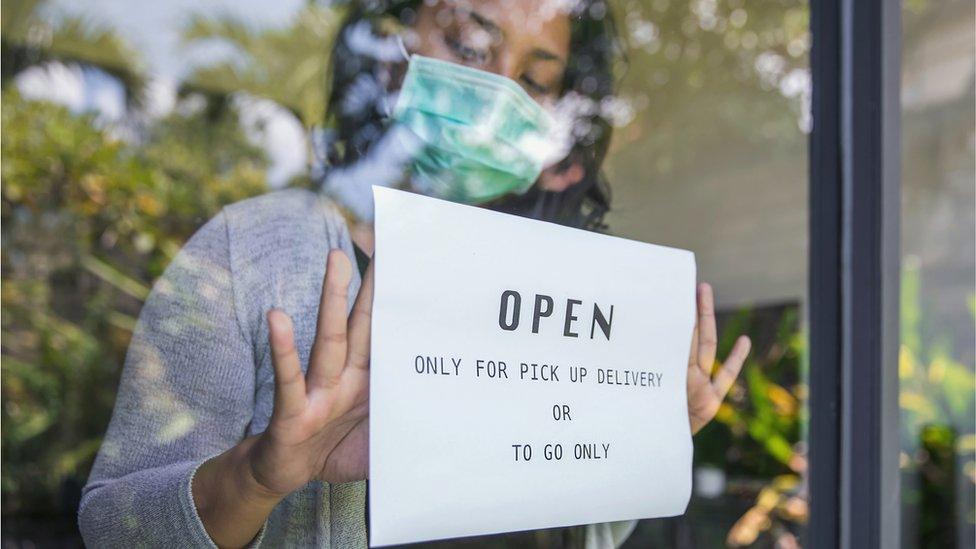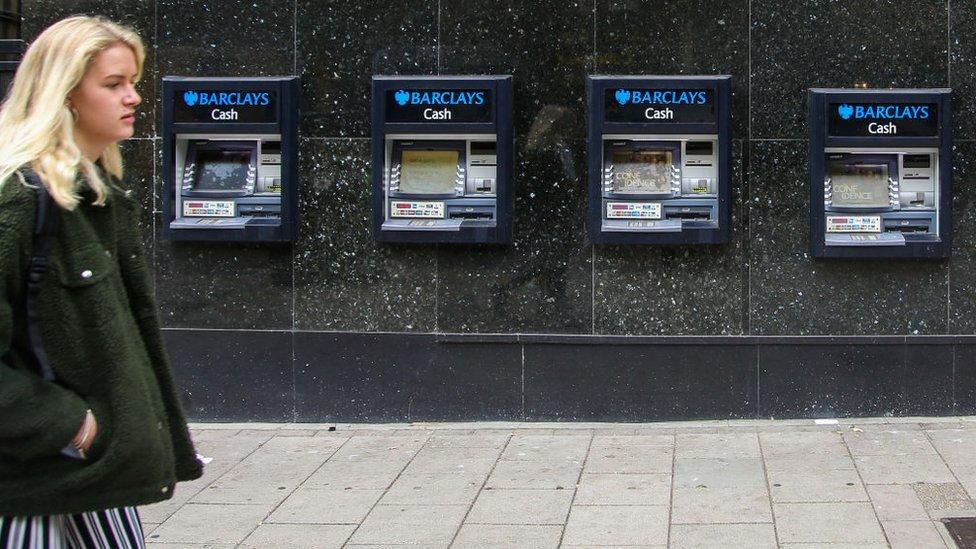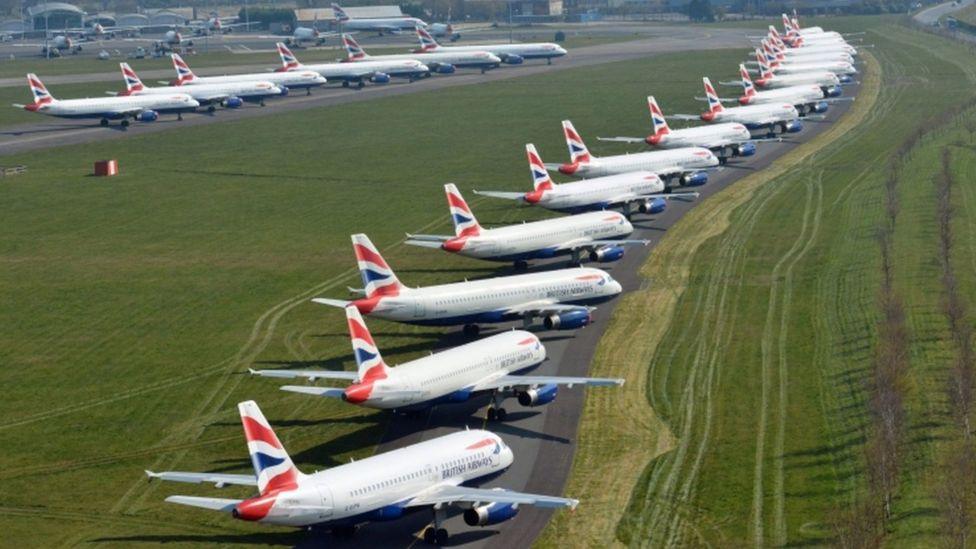Covid: How the pandemic has turned life and work on its head
- Published

It is 12 months since the UK entered lockdown. The anniversary brings to mind more than 146,000 UK mortalities ascribed to Covid-19 on death certificates. Of those, 9831 have been in Scotland.
Monitoring by Johns Hopkins University in Baltimore tells us there have been more than 2.72 million deaths worldwide, from more than 123m people infected.
In that year, there has also been a huge shift in the way we live our lives and the way the economy works. Here are some of the numbers that help tell the story:
11.2 million UK workers have been on furlough at some point in the past year, placed there by 1.3million employers. The Self-Employed Income Support Scheme has meant grants of up to £2,500 a month, reaching 2.2 million people - that is 65% of those thought to be eligible. Some 1.7 million self-employed workers did not qualify.
The total expected cost of the two income support schemes was estimated by the Office for Budget Responsibility, external this month to be £104bn.

Streaming video on demand has boomed, while cinemas had to close. More than half of UK homes are subscribers to Amazon Prime.
Home delivery has risen from 8.7% of total grocery sales in February last year to 15.4% this year, says Kantar data firm., external A quarter of UK homes now use home deliveries, and three million tonnes of food have been delivered by retailers to homes in the past year.
More than half of adults are using video calls more during the pandemic, and 29% told the Office for National Statistics, external they will continue to do so after it is over. The market value of US media platform Zoom rose more than four-fold in the past year, to more than $100bn. However, psychologists say it has brought stress, external and anxiety as people have spent much longer looking at pictures of themselves.
Of UK adults, 38% told surveyors from ONS this month that they intend to avoid crowded public spaces following the pandemic.
In the year to January, there was a drop of 65,000 in the number of Scots in payrolled jobs, not including self-employed people. The UK-wide figures, external suggest half of the job losses - nearly 700,000 - have been in hospitality and nearly two-thirds have been people aged under 25.

Pay growth slowed, and pay fell in real terms for some, with lower-paid people affected most. The Resolution Foundation found higher-paid jobs in the first six months of the economic crisis saw annual pay growth around 2.5%, but for the lower paid, it ranged between 0.2% and 1.4%. Young people, again, took the brunt of that slowdown.
Savings soared, but only for some. Wealthier households increased savings while people could not spend on travel or socialising. A Bank of England survey, external found 28% of people saved more, while 20% of households saw their savings depleted.
Companies became more flexible to keep trading in this year's lockdown than last spring. More than 80% of arts, entertainment and recreation and accommodation and food businesses were temporarily closed during spring 2020, but around 55% during January 2021., external In construction, around 30% of firms paused trading in spring 2020, down to less than 4% in early-2021.
The Office for Budget Responsibility forecasts the UK government deficit, external will be around £355bn this financial year. This is equivalent to 17% of GDP, which is a peacetime record. The average since 1970 has been 3.5%. Around £250bn of the forecast deficit is explained by more spending on public services (up £106bn), households (£82bn) and support for businesses (£62bn).

Economic output plummeted 20% during the first lockdown - the deepest recession in more than 300 years. But it rebounded later in the year. During 2020, the UK economy saw output drop 9.9% on the 2019 figure. In Scotland, the equivalent fall was 9.6%.
Men rolled up their sleeves to do more housework, but there is still gaping inequality in the amount of housework, childcare and home schooling required of women. They have been more likely to be furloughed, and more often work in sectors worst affected by closures.
City centres suffered, and will continue to do so as home working becomes a permanent feature of work for those who can do it - and that's disproportionately those on higher-paying jobs. A survey by the Fraser of Allander Institute, external found Scottish firms expect their office footfall to drop 25% to 55%. However, employers also reported that home working has hit innovation and productivity.
There was a 68% drop in output, external from the UK hospitality sector between February last year and January 2021. The sectors worst affected by closures and job losses - retail, events, hospitality, tourism - are the ones where young people have had a disproportionate share of jobs.
Deliveroo reported the value of transactions on its home delivery of food, external more than doubled between the start of 2020 and the start of 2021.

Cash was king for businesses in financial distress, but not for consumers: Link, the main UK cash machine network, reported the number of transactions at its machines fell by 43% over the past year, and the value of cash withdrawn was down 36%. It calculates there is £37bn less cash in consumers' pockets, purses and wallets.
Among big brand winners has been Dettol disinfectant. Kantar data firm reports sales of liquid soap and hand sanitiser up 127%. The Scotch Whisky industry pledged early in the crisis to produce enough ethanol for six million litres of hand sanitiser each month. Marketing analysts at Mintel say 28% of people say they use deodorant less in the past year, most notably among younger age groups.
The big losers in brands and retail have been in clothes and shoes for work and partying. The decline in conventional retail has been accelerated. ONS data show a drop in retail employment of 67,000, while around 600,000 retail workers are being furloughed during the lockdown of early 2021.

We're flying far less. Edinburgh Airport saw passenger numbers drop from 15 million in 2019 to 3.5 million last year - the level last seen in 1995. They were down 99% during the first lockdown.
IATA, representing airlines around the world, reports a drop by more than half in the number of international routes flown, external, from 30,000 to 12,000, and the average number of flights per month on remaining routes has more than halved. Passenger demand has gone back to where it was 23 years ago, down 66%, with Europe much more affected than Asia. The cumulative losses for the world's airlines in 2020 and 2021 are expected by IATA to reach $157bn (£114bn).
Although the housing market was closed for part of 2020, average prices rose 8.4% in Scotland in the year to December, external, and 8.5% across the UK. The strongest demand was for moving out of cities (London's population is reported to be sharply down), and as people sought more rooms for working at home and more green space for future lockdowns.
There has been a surge and spending splurge across gardening, DIY, baking, home cooking, running and - with swimming pools closed - wild water swimming. Spending on new bicycles and cycling accessories was up 45% last year, with buyers wanting to get more exercise and to avoid infection risk on public transport.
Dogs have been in demand as never before, as people want unconditional affection, they work from home more, and exercise by walking. The price for the most sought-after dog breeds - reportedly led by the cocker spaniel - has risen from less than £1,000 to as much as £4,000. Dog theft has also soared.
